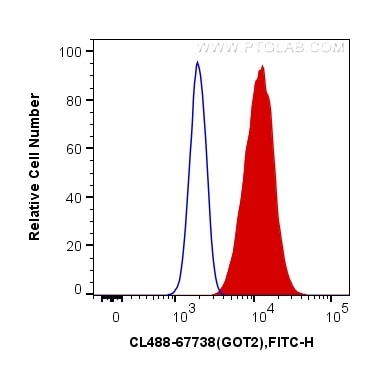Tested Applications
| Positive FC (Intra) detected in | HeLa cells |
Recommended dilution
| Application | Dilution |
|---|---|
| Flow Cytometry (FC) (INTRA) | FC (INTRA) : 0.40 ug per 10^6 cells in a 100 µl suspension |
| It is recommended that this reagent should be titrated in each testing system to obtain optimal results. | |
| Sample-dependent, Check data in validation data gallery. | |
Product Information
CL488-67738 targets GOT2 in FC (Intra) applications and shows reactivity with human, mouse, rat, pig, chicken samples.
| Tested Reactivity | human, mouse, rat, pig, chicken |
| Host / Isotype | Mouse / IgG1 |
| Class | Monoclonal |
| Type | Antibody |
| Immunogen | GOT2 fusion protein Ag6600 Predict reactive species |
| Full Name | glutamic-oxaloacetic transaminase 2, mitochondrial (aspartate aminotransferase 2) |
| Calculated Molecular Weight | 47 kDa |
| Observed Molecular Weight | 39-40 kDa |
| GenBank Accession Number | BC000525 |
| Gene Symbol | GOT2 |
| Gene ID (NCBI) | 2806 |
| RRID | AB_2923785 |
| Conjugate | CoraLite® Plus 488 Fluorescent Dye |
| Excitation/Emission Maxima Wavelengths | 493 nm / 522 nm |
| Form | Liquid |
| Purification Method | Protein G purification |
| UNIPROT ID | P00505 |
| Storage Buffer | PBS with 50% glycerol, 0.05% Proclin300, 0.5% BSA, pH 7.3. |
| Storage Conditions | Store at -20°C. Avoid exposure to light. Stable for one year after shipment. Aliquoting is unnecessary for -20oC storage. |
Background Information
GOT2 encodes the mitochondrial glutamate oxaloacetate transaminase and plays an essential role in the intracellular NAD(H) redox balance. Upregulation of GOT2 has been reported in various cancers, including breast cancer and pancreatic cancer. GOT2 mutation leads to autosomal recessive neurometabolic disorder.
Protocols
| Product Specific Protocols | |
|---|---|
| FC protocol for CL Plus 488 GOT2 antibody CL488-67738 | Download protocol |
| Standard Protocols | |
|---|---|
| Click here to view our Standard Protocols |



